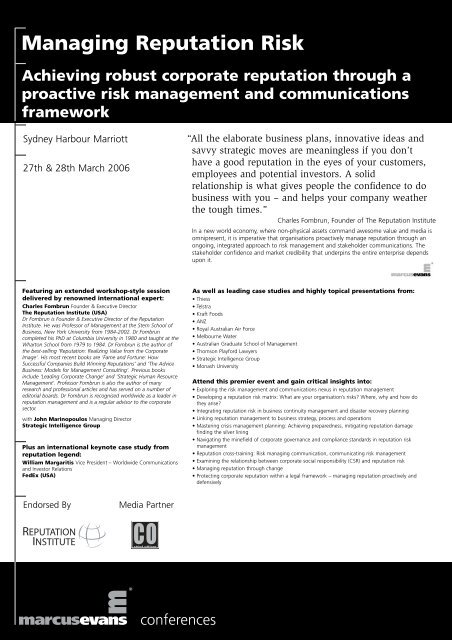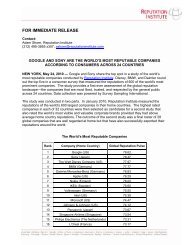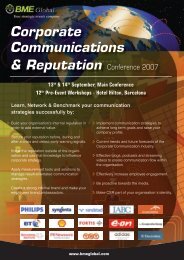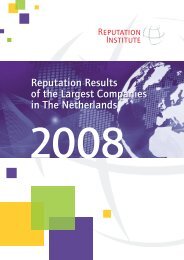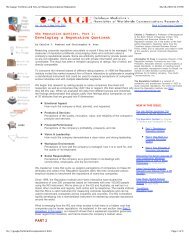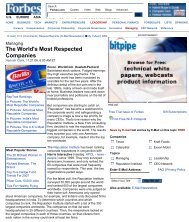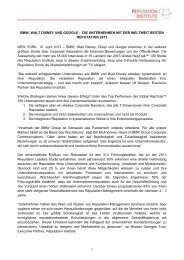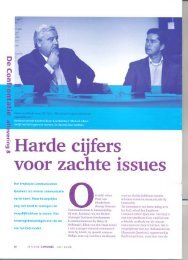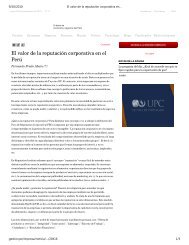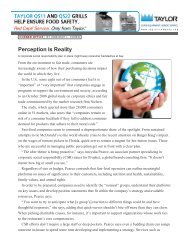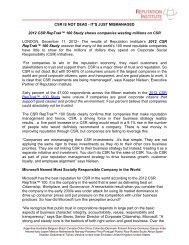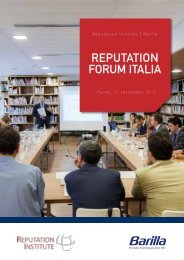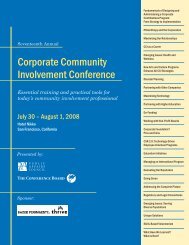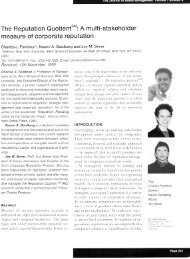Managing Reputation Risk - Reputation Institute
Managing Reputation Risk - Reputation Institute
Managing Reputation Risk - Reputation Institute
You also want an ePaper? Increase the reach of your titles
YUMPU automatically turns print PDFs into web optimized ePapers that Google loves.
<strong>Managing</strong> <strong>Reputation</strong> <strong>Risk</strong><br />
Achieving robust corporate reputation through a<br />
proactive risk management and communications<br />
framework<br />
Sydney Harbour Marriott<br />
27th & 28th March 2006<br />
“All the elaborate business plans, innovative ideas and<br />
savvy strategic moves are meaningless if you don’t<br />
have a good reputation in the eyes of your customers,<br />
employees and potential investors. A solid<br />
relationship is what gives people the confidence to do<br />
business with you – and helps your company weather<br />
the tough times.”<br />
Charles Fombrun, Founder of The <strong>Reputation</strong> <strong>Institute</strong><br />
In a new world economy, where non-physical assets command awesome value and media is<br />
omnipresent, it is imperative that organisations proactively manage reputation through an<br />
ongoing, integrated approach to risk management and stakeholder communications. The<br />
stakeholder confidence and market credibility that underpins the entire enterprise depends<br />
upon it.<br />
Featuring an extended workshop-style session<br />
delivered by renowned international expert:<br />
Charles Fombrun Founder & Executive Director<br />
The <strong>Reputation</strong> <strong>Institute</strong> (USA)<br />
Dr Fombrun is Founder & Executive Director of the <strong>Reputation</strong><br />
<strong>Institute</strong>. He was Professor of Management at the Stern School of<br />
Business, New York University from 1984-2002. Dr Fombrun<br />
completed his PhD at Columbia University in 1980 and taught at the<br />
Wharton School from 1979 to 1984. Dr Fombrun is the author of<br />
the best-selling ‘<strong>Reputation</strong>: Realizing Value from the Corporate<br />
Image’. His most recent books are ‘Fame and Fortune: How<br />
Successful Companies Build Winning <strong>Reputation</strong>s’ and ‘The Advice<br />
Business: Models for Management Consulting’. Previous books<br />
include ‘Leading Corporate Change’ and ‘Strategic Human Resource<br />
Management’. Professor Fombrun is also the author of many<br />
research and professional articles and has served on a number of<br />
editorial boards. Dr Fombrun is recognised worldwide as a leader in<br />
reputation management and is a regular advisor to the corporate<br />
sector.<br />
with John Marinopoulos <strong>Managing</strong> Director<br />
Strategic Intelligence Group<br />
Plus an international keynote case study from<br />
reputation legend:<br />
William Margaritis Vice President – Worldwide Communications<br />
and Investor Relations<br />
FedEx (USA)<br />
As well as leading case studies and highly topical presentations from:<br />
• Thiess<br />
• Telstra<br />
• Kraft Foods<br />
• ANZ<br />
• Royal Australian Air Force<br />
• Melbourne Water<br />
• Australian Graduate School of Management<br />
• Thomson Playford Lawyers<br />
• Strategic Intelligence Group<br />
• Monash University<br />
Attend this premier event and gain critical insights into:<br />
• Exploring the risk management and communications nexus in reputation management<br />
• Developing a reputation risk matrix: What are your organisation’s risks? Where, why and how do<br />
they arise?<br />
• Integrating reputation risk in business continuity management and disaster recovery planning<br />
• Linking reputation management to business strategy, process and operations<br />
• Mastering crisis management planning: Achieving preparedness, mitigating reputation damage<br />
finding the silver lining<br />
• Navigating the minefield of corporate governance and compliance standards in reputation risk<br />
management<br />
• <strong>Reputation</strong> cross-training: <strong>Risk</strong> managing communication, communicating risk management<br />
• Examining the relationship between corporate social responsibility (CSR) and reputation risk<br />
• <strong>Managing</strong> reputation through change<br />
• Protecting corporate reputation within a legal framework – managing reputation proactively and<br />
defensively<br />
Endorsed By<br />
Media Partner<br />
conferences
Conference Programme Day One<br />
Monday 27th March 2006<br />
Register Now<br />
Contact Simon McCartney at marcus evans<br />
T +61 (2) 9238 7200<br />
F +61 (2) 9238 7286<br />
www.marcusevans.com<br />
0830 Morning coffee and registration<br />
0850 Welcoming address from the Chair<br />
0900 Session One – Keynote Address<br />
<strong>Reputation</strong> risk management: An overview of a compelling<br />
business case and a critical confluence<br />
“Regard your good name as the richest jewel you can possibly be possessed of<br />
– for credit is like fire; when once you have kindled it you may easily preserve<br />
it, but if you once extinguish it, you will find it an arduous task to rekindle it<br />
again. The way to gain a good reputation is to endeavour to be what you<br />
desire to appear.” Socrates<br />
<strong>Reputation</strong> is an asset that, like any other, is subject to injury and loss.<br />
<strong>Reputation</strong> risks arise where situations or occurrences in other categories of risk<br />
also threaten an organisation’s image and stakeholder regard. As such, the task<br />
of managing reputation risk represents a critical nexus for risk management<br />
and stakeholder communications specialists. In this session, Grahame explores<br />
what reputation risk means for organisations and why forward-thinking<br />
companies are recognising the business value of this asset, undertaking<br />
integrated, coordinated strategies to protect and promote it.<br />
• Quantifying reputation’s asset value and the bottom-line value of its<br />
management<br />
• Pursuing an integrated approach to risk management, governance, compliance<br />
and corporate social responsibility<br />
• Establishing responsibility for reputation risk in your organisation<br />
• Investigating the relationship between reputation risks and other risk-sets<br />
• Understanding the risk management and communications nexus: Synergising<br />
functions, goals and insight<br />
Professor Grahame Dowling Professor of Marketing<br />
Australian Graduate School of Management, UNSW<br />
<strong>Managing</strong> Director<br />
<strong>Reputation</strong> <strong>Institute</strong> (Australia)<br />
1000 Session Two – Case Study<br />
Developing a reputation risk matrix: What are your<br />
organisation’s risks? Where, why and how do they arise?<br />
Mapping the risks that affect your organisation – understanding what they are,<br />
whence they arise and why – is a critical step in developing the strategy by<br />
which to control and manage reputation risk. Any organisation has a number<br />
of stakeholder groups and operating environments and effective vulnerability<br />
analysis – the basis of a risk matrix – must be executed with due consideration<br />
for these various interests and fields. In the high-risk, critical operating<br />
environment occupied by the RAAF, where political concerns intersect with<br />
national security, hazardous tasks and human life, the stakes are especially<br />
high. In this session, Joanna will discuss how the RAAF has engaged senior<br />
staff and risk management and corporate communications personnel to<br />
develop an incisive, robust reputation risk matrix.<br />
• Conducting reputation risk vulnerability analysis<br />
• Understanding risk in terms of different stakeholder groups<br />
• Building a reputation risk matrix<br />
• Elucidating critical risk relationships through risk mapping<br />
• Appreciating the fallout effects that can trigger reputation risks<br />
• Promoting reputation risk management awareness among personnel through<br />
training<br />
Wing Commander Joanna Elkington Deputy Director Communication &<br />
<strong>Reputation</strong> Management<br />
Royal Australian Air Force<br />
1045 Morning refreshments and networking<br />
1115 Session Three – International and Local Expert Workshop<br />
Part A<br />
Integrating reputation risk in business continuity management<br />
and disaster recovery planning<br />
“While lengthy periods of downtime have always been potentially crippling,<br />
today even minimal service and product unavailability can have a significant<br />
impact on business success and reputation.” Business-Government Task Force<br />
on Critical Infrastructure<br />
<strong>Risk</strong> that eventuates can trigger a domino effect. When a crisis occurs, its<br />
consequences are likely to be felt right along the chain of business processes<br />
and reputational degradation can develop into self-fulfilling prophecy, swiftly<br />
exacerbating critical situations. On the other hand, a solid reputation acts as a<br />
buffer against negativity generated around the crisis, providing an overall<br />
positive context that puts the incident in perspective. It also helps to garner the<br />
stakeholder confidence necessary to get things up and running again. As such,<br />
reputation risk management is a linchpin in any business continuity and disaster<br />
recovery plan to reduce risk, minimize damage and disruption and speed<br />
resumption of operations and needs be integrated accordingly. In this session,<br />
Charles and John detail a highly effective approach – developed through<br />
extensive fieldwork – to integrating reputation risk management with business<br />
continuity planning and disaster recovery.<br />
Part B:<br />
Linking reputation management to business strategy, process<br />
and operations<br />
“The only way to successfully manage reputation and brand risk is by an<br />
integrated strategy that comes from the top - for it has to be not the gloss that<br />
paints over the cracks but one of the key drivers of your corporate strategy.”<br />
David Davies, id risk<br />
<strong>Reputation</strong> management is a core component of a cycle through which<br />
companies build value for stakeholders and that involves employees, customers,<br />
investors and other key influential partners. This results in “reputation capital”<br />
– a highly valuable economic asset.<br />
<strong>Reputation</strong> management can be linked through the use of detailed analyses<br />
obtained from stakeholder opinion surveys, content analysis of media coverage<br />
and messaging analysis.<br />
In this workshop, Charles and John will demonstrate how to develop your own<br />
reputation management platform through:<br />
• Identifying the gaps in strategy and process<br />
• Cross-referencing the drivers of reputation within and across stakeholder<br />
groups<br />
• Analysing identified gaps strategically<br />
• Identifying tactical domains of greatest potential payoff and pools of<br />
opportunity<br />
• Integrating your organisation’s strategy, reputation management and business<br />
needs<br />
Charles Fombrun Founder & Executive Director<br />
<strong>Reputation</strong> <strong>Institute</strong> (USA)<br />
John Marinopoulos <strong>Managing</strong> Director<br />
Strategic Intelligence Group<br />
1245 Luncheon<br />
1345 Session Four – Case Study<br />
Mastering issue management through planning: Achieving<br />
preparedness, maximising reputation benefits and eliminating<br />
potential damage<br />
As Australia's largest domestic banking and financial services organisation, the<br />
Commonwealth Bank Group, reputation is understood to be a critical asset and<br />
mitigating risk is high on the agenda. The experience of the group reveals that<br />
much of what any company must do in the event of a crisis can and should be<br />
planned in advance of any such situation. Inside and outside of the financial<br />
services industry, how your organisation plans for – and is seen to deal with –<br />
critical occurrences often determines the degree of benefit or damage to your<br />
reputation. For, managed skilfully and planned successfully, a critical incident<br />
can reveal a silver lining that empowers your organisation to demonstrate its<br />
mettle and improve practices, thus enhancing stakeholder confidence. In this<br />
session, Jill explores:<br />
• Building a coordinated crisis planning team – involving the right representatives<br />
from the right departments and cultivating collaboration<br />
• Training and simulation for optimal crisis preparation<br />
• Monitoring and analysing identified risk hot-spots<br />
• Developing strategic allies – strengthening support through proactive<br />
partnerships<br />
• <strong>Managing</strong> reputation risk in the face of generalised threatened crises to<br />
maximise benefit to the organisation<br />
Jill Lester Executive General Manager – Communication, Community and<br />
<strong>Reputation</strong><br />
Commonwealth Bank
Conference Programme Day One cont’d..<br />
Conference Programme Day Two<br />
Tuesday 28th March 2006<br />
1430 Session Five – Case Study<br />
Navigating the minefield of corporate governance and<br />
compliance standards in reputation risk management<br />
New governance and compliance standards – from AS8001-8003 to Basel II<br />
and Sarbanes-Oxley – demand that heightened, tightened risk management is<br />
strategically implemented within organisations on an enterprise-wide scale. As<br />
forward-thinking organisations move to ensure an integrated approach to<br />
compliance, governance and risk management, so too do they recognise the<br />
requirement to protect reputation as a business asset and perceive the crucial<br />
link between reporting requirements and reputation management – itself a<br />
confluence joining risk management and communications. In this session, Sean<br />
will explain the obligations these standards lay upon organisations’ reputation<br />
risk management, the impact of reporting requirements upon reputation and<br />
what ANZ is doing to meet these demands.<br />
• Avoiding pitfalls in integrating risk management with governance and<br />
compliance standards<br />
• Protecting reputation as a business asset – what are the standards affecting<br />
how organisations guard this high value ‘possession’?<br />
• Achieving strategic cooperation between risk management and corporate<br />
communications to meet governance and compliance standards<br />
• Understanding reporting requirements – what are they and how does their<br />
observance impact reputation?<br />
Sean Hughes General Manager – Group Compliance<br />
ANZ<br />
1515 Afternoon refreshment and networking break<br />
1540 Session Six – Expert Insight<br />
<strong>Reputation</strong> cross-training: <strong>Risk</strong> managing communication,<br />
communicating risk management<br />
<strong>Risk</strong> managers often deal with the concrete: how to handle a chemical spill, a<br />
potential pandemic or a possible product recall. They know communication is<br />
vital to their work – yet often they may not be alive to all the value that<br />
professional communication could add to their work. On the other hand,<br />
professional communicators may shy from involvement in risk communication<br />
because they see it as often technical, focused on complex data and<br />
calculations of probability that potential risks will become actualised. Both fields<br />
need to know more about the other. In this session, Chris seeks to bridge the<br />
gap, exploring how risk managers can deploy communication strategies to<br />
protect corporate reputation – and also how communicators can better grasp<br />
and apply key risk communication concepts to guard corporate brand equity<br />
more effectively.<br />
• <strong>Reputation</strong> cross-training: how risk managers and communicators can learn to<br />
speak the same language through scenario-based planning<br />
• Enhancing corporate reputation through integrated strategic risk management<br />
and communication<br />
• Ensuring internal stakeholders understand the link between risk management<br />
and external stakeholder communication<br />
• Expanding your repertoire of risk communication tools<br />
• Sustaining an integrated approach over time<br />
Chris Galloway Lecturer – Public Relations<br />
Monash University<br />
1625 Session Seven – Interactive Panel Discussion<br />
Exploring the risk management and communications nexus in<br />
reputation management<br />
The confluence between risk management and stakeholder communications is<br />
both compelling and rapidly gaining recognition across industries, however, it<br />
remains less than well understood in many organisations and is not always<br />
supported by internal structures and communication lines. Panelists will discuss<br />
how synergising and cross-fertilising risk management and communications<br />
boosts the effectiveness of each field, providing a unique means by which to<br />
strengthen the successful pursuit of business objectives. Strategies for achieving<br />
this synergy will also be covered. This session will provide a forum in which<br />
delegates and panelists can engage in critical discussion of their own<br />
experiences, hurdles and questions.<br />
Wing Commander Joanna Elkington Deputy Director Communication &<br />
<strong>Reputation</strong> Management<br />
Royal Australian Air Force<br />
Chris Galloway Lecturer in Public Relations<br />
Monash University<br />
1700 Closing remarks from the Chair and end of Day One<br />
0830 Morning coffee<br />
0850 Welcoming address from the Chair<br />
0900 Session One – Case Study<br />
Examining the relationship between corporate social<br />
responsibility (CSR) and reputation risk<br />
Employees, investors and consumers are increasingly demanding demonstrated<br />
responsibility on the part of corporations in the areas of sustainability and social<br />
and environmental impact. CSR is therefore critically linked with reputation and<br />
must be addressed accordingly in any risk management programme. Kraft has<br />
led industry in negotiating this growing issue, striving to pursue not only<br />
socially responsible strategies but also reputation risk control through effective<br />
communication to stakeholders of its work in the area of healthy eating and<br />
obesity prevention. In this session, Andrew describes how Kraft has<br />
strengthened its reputation and bolstered stakeholder support in the drive to<br />
make CSR a part of the organisation’s identity.<br />
• Exploring growing investor and consumer demands for CSR<br />
• Examining the impact and value of CSR rating in managing reputation<br />
• Incorporating CSR in your reputation risk management strategy<br />
• Understanding reporting requirements and CSR in action<br />
Andrew Kilsby Manager Corporate & Government Affairs – Australia & New<br />
Zealand<br />
Kraft Foods<br />
0945 Session Two – Case Study<br />
Collaborative showcase – How risk management and corporate<br />
affairs have synergised forces at Melbourne Water<br />
Because reputation risks eventuate as fallout from other risks, and because<br />
reputation management is crucially executed through communications, tackling<br />
the unique and exigent challenge of controlling reputation risk requires the<br />
collaborative, coordinated action of risk management and corporate<br />
communications people. Melbourne Water has developed a highly effective tag<br />
team that is empowered by the pooled intelligence and strategy of these<br />
departments, and as a result is enjoying the bottom-line and functional benefits<br />
of a robust, positive reputational asset.<br />
Christine Gibbs General Manager Communications Strategy<br />
Carol Borg Manager <strong>Risk</strong> & Insurance<br />
Melbourne Water<br />
1030 Morning refreshments and networking break<br />
1050 Session Three – Case Study<br />
<strong>Managing</strong> reputation through change: How Telstra has shifted<br />
the public conversation<br />
“[<strong>Reputation</strong> risk management] will revolve around efficient communication<br />
and long-term solid relationships inside and outside the organisation.<br />
<strong>Reputation</strong> can constitute a major competitive advantage in a turbulent world<br />
like today’s.” Jean-Paul Louisot<br />
Australia's highest-profile company has navigated multiple political, regulatory<br />
and media challenges over many years. In recent months, however, the<br />
company has argued particularly passionately for regulatory reform and<br />
articulated its vision for communications in the twenty-first century. During this<br />
process, the company has adopted new modes of communication including<br />
direct communication with its 1.6 million Australian shareholders, the nation's<br />
first corporate podcasting service, an upgraded internal communications<br />
function and a new website complete with employee blogs. In effecting these<br />
changes, strategic leveraging of existing reputation has been critical, as has the<br />
careful protection of this key asset throughout the 'risky' business of change. In<br />
this session, Andrew will talk frankly about the cost involved in changing the<br />
public conversation, the tactics used, the role of the media in the new<br />
operating model and how Telstra has strived to secure the health of its<br />
reputation through these major shifts.<br />
• Identifying expectations – who are your stakeholders? How many reputations<br />
do you have?<br />
• Pursuing stakeholder dialogues that promote receptiveness to change<br />
• Factoring reputation risk in change initiatives<br />
• Leveraging reputation to bring about environmental, market and regulatory<br />
change<br />
• Protecting reputation through change: Monitoring and measuring reputation<br />
impacts during change phases<br />
Andrew Maiden Head of Telstra News Service<br />
Telstra
Conference Programme Day Two cont’d..<br />
Register Now<br />
Contact Simon McCartney at marcus evans<br />
T +61 (2) 9238 7200<br />
F +61 (2) 9238 7286<br />
www.marcusevans.com<br />
1135 Session Four – Case Study<br />
Best practice stakeholder communication and involvement for<br />
reputational vigor in any weather<br />
Stakeholder communication is a keystone in the fort of reputation risk<br />
management, which defends ground gained and backs-up missions of<br />
advancement. As Thiess has demonstrated with its management of the Lane<br />
Cove tunnel issue, ongoing and committed engagement with stakeholders is a<br />
damage control measure critical to the successful outcome of all other activities<br />
undertaken to mitigate injury, reputational and beyond. In this session, Chris<br />
examines the crucial coherence of internal and external communications, the<br />
value in promoting stakeholder-wide participation in reputation strengthening,<br />
as well as adroit pre-emptive strategies for minimising flow-on stakeholder<br />
dissonance in the event of critical incidence.<br />
• Achieving internal and external communications consistency<br />
• Engaging employees in understanding and nurturing reputation – inculcating a<br />
top-down approach<br />
• Communicating with community – interacting honestly and fairly with those<br />
touched by your organisation’s activities<br />
• Heading off harm: Pre-emptive tactics to prevent eruption of further issues<br />
• Turning a successfully managed ‘crisis’ into a positive reputation risk<br />
management strategy<br />
Chris Peat Manager for Community Corporate Affairs<br />
Thiess<br />
1220 Luncheon<br />
1310 Session Five – International Keynote Case Study<br />
Implementing a proactive, inside-out reputation risk<br />
management strategy at FedEx<br />
“<strong>Reputation</strong> is a strategic asset that needs to be managed in a highly<br />
disciplined and focused manner on a sustained basis. We believe that a strong<br />
reputation can act as a life preserver in a crisis and as a tailwind when the<br />
company is on the offensive.” William Margaritis<br />
FedEx’s enviable reputation of reliability and top-down commitment to the<br />
organisation and the quality of service it provides arises not from strategic<br />
product placement or other advertising strategy. Rather, by taking an inside-out<br />
approach, FedEx has established a reputation so strong among internal<br />
stakeholders that it has naturally extended outwards, informing the esteem in<br />
which external stakeholder hold the worldwide transport and cargo giant. By<br />
studying the ways in which different elements of reputation affect stakeholder<br />
behaviour, the company has established profitable insight into the links<br />
between reputation and stakeholder value.<br />
• Understanding the role of the CEO and senior executives in reputation and its<br />
management<br />
• Developing and conducting stakeholder surveys<br />
• Putting reputation risk on the risk management agenda<br />
• Realising the bottom-line, value impact of reputation risk and its management<br />
• Achieving company-wide crisis preparedness through scenario simulations<br />
• Utilising marketing and promotional opportunities to consolidate reputation<br />
William Margaritis Vice President – Worldwide Communications and<br />
Investor Relations<br />
FedEx<br />
William has been at FedEx headquarters in Memphis since May 1997. He has<br />
led communications for numerous crises, acquisitions, rebranding initiatives,<br />
employee change management programs and a new go-to-market strategy. He<br />
has successfully transcended the image of FedEx from an air express carrier to a<br />
full-service transportation powerhouse.<br />
Prior to joining FedEx, William was Vice President of Bechtel International,<br />
based in London, England, responsible for managing public relations and<br />
marketing communications for Europe, Middle East, Africa and Southwest Asia.<br />
He also worked in Washington DC, and Athens for separate divisions of the<br />
company.<br />
In addition to his extensive international communications background, he<br />
serves on various boards, including the Larry King Cardiac Foundation, the<br />
Arthur Page Society, Big Brothers/Big Sisters of Greater Memphis and the Board<br />
of Counselors for the Council on Public Relations Agencies.<br />
1440 Afternoon refreshments and networking break<br />
1500 Session Six - Case Study<br />
Coming from a low base: Minimising the impact on your<br />
business risk when your industry has a low reputation<br />
Banks, telecommunications providers, tollway operators and health insurers -<br />
what do they all have in common? Put simply, their industries are unloved. But<br />
that doesn't mean that your business can't stand out from the crowd and<br />
culitvate a strong reputation that attracts stakeholder favour and esteem. In<br />
this session, Trish explores how a business can grow its reputation despite its<br />
industry, drawing on her complement of experience in both corporate and<br />
marketing roles in organisations as diverse as CityLink, Melbourne Airport,<br />
CBA, Ericsson and Medibank Private.<br />
• Examining the risks faced by organisations in 'unloved' industries<br />
• Taking your business on a journey - the preparation and the execution<br />
• Understanding the role your people play<br />
• Exploring how CSR can be a key differentiator<br />
• Seeing proof that it can be done - reflecting on the reputational achievements<br />
of CityLink and Medibank Private<br />
Trish Hyde Public Affairs Manager<br />
Medibank Private<br />
1545 Session Seven – Expert Address<br />
Protecting corporate reputation within a legal framework –<br />
managing reputation proactively and defensively<br />
“Convey a libel in a frown, And wink a reputation down.” Jonathan Swift<br />
In order to protect this strategic asset, it is critical that key reputation managers<br />
within your organisation possess a firm understanding of the legal framework<br />
relevant to corporate reputation. On the one hand, this legal context<br />
establishes the limits of what can be protected. On the other, it provides the<br />
armoury and authority that can be invoked to defend reputation against the<br />
threat of damage. Through a series of leading Australian cases and practical<br />
examples, Barry will cut a clear track through the rules, risks and remedies<br />
pertaining to corporate reputation, thus empowering you to manage<br />
reputation both proactively and defensively in your organisation.<br />
• Knowing the law – what are the relevant laws and significant legal concepts<br />
pertaining to corporate reputation?<br />
• Practical steps to protect your organisation’s reputation to minimise the legal<br />
risks<br />
• Exploring what the law will and won’t protect<br />
• Understanding the rights and remedies available to protect your organisation’s<br />
reputation<br />
• Ensuring you avoid damaging your organisational reputation and others’<br />
• Preparing legally sound advertising and promotional campaigns<br />
Barry Stewart Senior Associate - Corporate<br />
Thomson Playford Lawyers<br />
1630 Closing remarks from the Chair and end of Conference<br />
Endorsed By<br />
The <strong>Reputation</strong> <strong>Institute</strong> (www.reputationinstitute.com) is a private research and<br />
advisory organisation devoted to building thought leadership about corporate<br />
reputations, their management, measurement and valuation. The RI brings together a<br />
global network of academics and practitioners dedicated to advancing knowledge<br />
about corporate reputations and improving the practice of reputation management.<br />
The <strong>Reputation</strong> <strong>Institute</strong> was founded by Charles J Fombrun and Cees B M van Riel in<br />
1997.<br />
The <strong>Reputation</strong> <strong>Institute</strong> invites individuals and companies who share the RI’s mission<br />
to become members of the RI. To provide outreach services to companies and<br />
individuals around the world, RI is actively developing an international network of<br />
Affiliates and Associates. The RI currently works with local RI Representatives and<br />
Affiliates in each of the following countries: Australia, Brazil, Chile, Denmark, France,<br />
Germany, Greece, India, Italy, Netherlands, Norway, South Africa, Spain, Sweden,<br />
Switzerland, Turkey, United Kingdom, and the United States.
<strong>Managing</strong> <strong>Reputation</strong> <strong>Risk</strong><br />
CC448 | Please write in BLOCK CAPITALS<br />
Sales Contract<br />
Please complete this form immediately and fax back to<br />
Salutation: Name:<br />
Position:<br />
Email:<br />
Salutation: Name:<br />
Position:<br />
Email:<br />
Salutation: Name:<br />
Position:<br />
Email:<br />
Organisation:<br />
Address:<br />
City: State: Postcode:<br />
Tel: ( ) Fax: ( )<br />
Nature of Business:<br />
Company Size: ■ 1-9 ■ 10-24 ■ 25-49 ■ 50-99 ■ 100-249 ■ 250-499<br />
■ 500-999 ■1000+<br />
Authorisation<br />
This booking is invalid without a signature.<br />
Signatory must be authorised to sign on behalf of contracting organisation<br />
Name of Authorising Manager:<br />
Position:<br />
Signature:<br />
Date:<br />
Fees<br />
■ Standard Conference Fee Two Day Event @ $2480 + 10% GST = $2728<br />
Conference documentation available online. A website and password will be provided to before the<br />
event<br />
■ All subsequent attendees from the same organisation attend at half price* @ $1240 +<br />
10% GST = $1364<br />
Given that the conference advocates an enterprise approach to <strong>Reputation</strong> <strong>Risk</strong> Management, a<br />
pricing structure has been specially set to allow for delegates from both communications and risk<br />
divisions to attend<br />
■ CO Magazine & <strong>Reputation</strong> <strong>Institute</strong> 10% Members Discount*<br />
■ Early Bird 10% Discount* A limited number of early bird seats are available. Please ask for details<br />
■ Online Documentation @ $599 + 10% GST = $658.90. If you are unable to attend the<br />
conference but wish to obtain the conference documentation, please complete the section above and<br />
return with payment. A website and password will be provided to access the documentation postevent.<br />
* These discounts may not be used in conjunction with any other offer.<br />
Why you must attend<br />
Increasingly, astute organisations are realising the importance of reputation as a business asset for the<br />
tremendous impact it has on an organisation’s bottom-line and functionality. According to the 2005<br />
Aon survey, reputation is the top corporate risk identified by organisations in Australia. By directly<br />
affecting stakeholder confidence and market credibility, reputation injury has material consequences<br />
for enterprises. On the other hand, a well managed reputation attracts and retains investment capital,<br />
sales, lender confidence, customers, high quality employees and management, business partner<br />
confidence and protection from negative publicity. <strong>Reputation</strong> is thus critical to any organisation's<br />
competitive advantage and should be guarded carefully and strategically.<br />
Whilst effective stakeholder communications and crisis planning are critical elements of an overall<br />
strategy, managing reputation is about more than slick post-crisis clean-ups. It requires proactive<br />
prevention; it requires an ongoing, holistic and top-down approach that integrates risk management<br />
with internal and external communications.<br />
Who must attend<br />
FAX: +61 (2) 9238 7286<br />
Designed for those Managers charged with the exigent duty of ensuring the hygiene and vigour of<br />
their organisations’ reputations, this event will be particularly relevant to:<br />
CEOs, CFOs, GMs and Directors, Senior Managers and Heads of:<br />
• <strong>Risk</strong> Management • Corporate Governance & Compliance<br />
• Corporate Affairs • Public Affairs • Public Relations<br />
• External Relations • Internal Communications • Investor Relations<br />
• Corporate Communications • Marketing • Media Relations<br />
• Corporate Citizenship and Social Responsibility<br />
Register Now<br />
Contact Simon McCartney at marcus evans<br />
T +61 (2) 9238 7200<br />
F +61 (2) 9238 7286<br />
www.marcusevans.com<br />
Date 27th & 28th March 2006<br />
Venue Sydney Harbour Marriott, 30 Pitt St, Sydney<br />
marcus evans<br />
Level 7, 77 Castlereagh Street, Sydney NSW 2000<br />
www.marcusevans.com<br />
Method of Payment<br />
Please note that payment must be received before the event. Payment is required within 5<br />
working days on receipt of invoice.<br />
Cheque: Made payable to Marcus Evans (ANZ) Limited<br />
Bank Transfer: HSBC Bank Australia Limited<br />
92 King Street, Sydney NSW 2000, Australia.<br />
BSB 342-079. Account No. 053609-001 quoting delegate name(s) and<br />
CC448 as reference.<br />
Please debit my ■ VISA ■ MasterCard ■ American Express ■ Diners Club<br />
Credit Card No:<br />
■■■■ ■■■■ ■■■■ ■■■■<br />
American Express Security Code:<br />
■■■■<br />
Card Holders Name: ___________________________________________________________<br />
Signature: ________________________________________________Exp. Date:_____ /_____<br />
Terms & Conditions:<br />
1.Fees are inclusive of programme materials and refreshments.<br />
2.Payment Terms: Following completion and return of the registration form, full payment is required within 5 days<br />
from receipt of invoice. PLEASE NOTE: payment must be received prior to the conference date. A receipt will be issued<br />
on payment. Due to limited conference space, we advise early registration to avoid disappointment. A 50% cancellation<br />
fee will be charged under the terms outlined below. We reserve the right to refuse admission if payment is not received<br />
on time. Unless otherwise stated on the booking form, payment must be made in Australian dollars.<br />
3.Cancellation/Substitution: Provided the total fee has been paid, substitutions at no extra charge up to 14 days<br />
before the event are allowed. Substitutions between 14 days and the date of the event will be allowed subject to an<br />
administration fee of equal to 10% of the total fee that is to be transferred. Otherwise all bookings carry a 50%<br />
cancellation liability immediately after a signed sales contract has been received by marcus evans (as defined above)<br />
Cancellations must be received in writing by mail or fax six (6) weeks before the conference is to be held ie Monday<br />
13th February 2006 in order to obtain a credit voucher representing 50% of the total fee to be utilized against the<br />
costs of any future marcus evans conference. Thereafter, the full conference fee is payable and is non refundable.<br />
The service charge is completely non-refundable and non creditable. Payment terms are five days and payment must<br />
be made prior to the start of the conference. Non-payment or non-attendance does not constitute cancellation. By<br />
signing this contract, the client agrees that in case of dispute or cancellation of this contract that marcus evans will<br />
not be able to mitigate its losses for any less than 50% of the total contract value. If, for any reason, marcus evans<br />
decides to cancel or postpone this conference, marcus evans is not responsible for covering airfare, hotel, or other<br />
travel costs incurred by clients. The conference fee will not be refunded, but can be credited to a future conference.<br />
Event programme content is subject to change without notice.<br />
4.Copyright etc: All intellectual property rights in all materials produced or distributed by marcus evans in<br />
connection with this event is expressly reserved and any unauthorized duplication, publication or distribution is<br />
prohibited.<br />
5.Privacy/Data Protection: Personal information is collected, stored and used by the Marcus Evans group in<br />
accordance with Privacy and Spam legislation. Client confirms that it has requested and consented to marcus evans<br />
retaining client information on marcus evans group companies’ database to be used by marcus evans group’s<br />
companies and passed to selected third parties, to assist in communicating products and services which may be of<br />
interest to the client. If the client wishes to stop receiving such information please inform marcus evans at Marcus<br />
Evans (ANZ) Limited, Marketing Dept, Level 7, 77 Castlereagh Street, Sydney, NSW 2000 (e-mail address:<br />
marketing@marcusevansau.com) Tel: +61 2 9223 2137, Fax: +61 2 9223 2352. For training and security purposes,<br />
telephone calls may be recorded.<br />
6.Important Note: While every reasonable effort will be made to adhere to the advertised package, marcus<br />
evans reserves the right to change event dates, sites or location or omit event features, or merge the event with<br />
another event, as it deems necessary without penalty and in such situations no refunds, part refunds or alternative<br />
offers shall be made. In the event that marcus evans permanently cancels the event for any reason whatsoever,<br />
(including, but not limited to any force majeure occurrence) and provided that the event is not postponed to a later<br />
date nor is merged with another event, the Client shall receive a credit note for the amount that the Client has paid to<br />
such permanently cancelled event, valid for up to one year to be used at another marcus evans event. No refunds,<br />
part refunds or alternative offers shall be made.<br />
7.Governing law: This Agreement shall be governed and construed in accordance with the law of New South Wales<br />
and the parties submit to the exclusive jurisdiction of the Courts in Sydney. However marcus evans only is entitled<br />
to waive this right and submit to the jurisdiction of the courts in which the Client's office is located.<br />
Business Opportunities: A limited amount of exhibition space is available at the conference.<br />
Sponsorship opportunities including lunch and documentation also exist. For further details contact<br />
Darrin Stollznow on (02) 9238 7125<br />
I would like to thank everyone who has helped with the research and organisation of this event,<br />
particularly the speakers for their support and commitment<br />
- Kate Concannon Conference Producer<br />
conferences<br />
marcus evans and marcus evans conferences are registered brands of Marcus<br />
Evans (ANZ) Limited. Marcus Evans (ANZ) Limited ARBN 106 922 776<br />
Air Travel & Accommodation:<br />
FCm Travel Solutions is the corporate division of Flight Centre Limited, one of<br />
the world's fastest growing travel innovators and an award winning employer of<br />
choice. Please contact Anne Hadwen on (07) 3032 9190 or 1300 656 570 for<br />
assistance with all your travel requirements.


